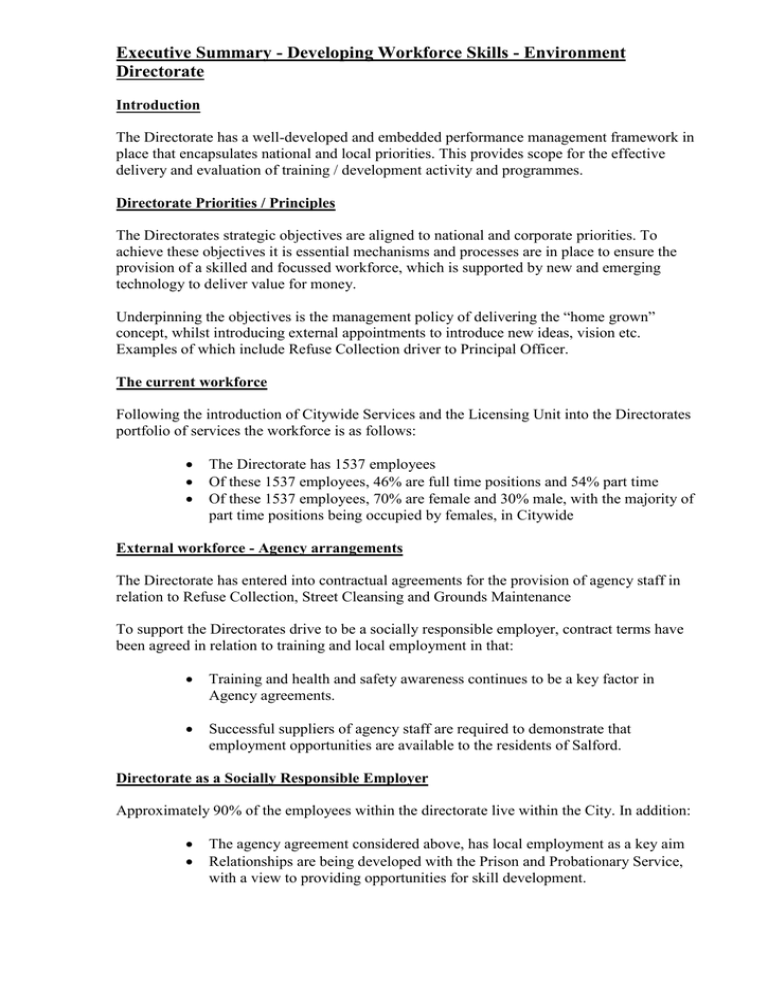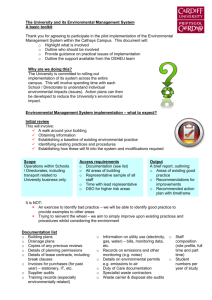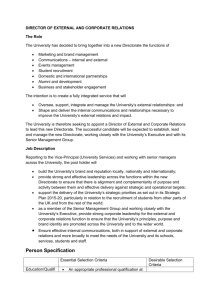Executive Summary - Developing Workforce Skills - Environment Directorate
advertisement

Executive Summary - Developing Workforce Skills - Environment Directorate Introduction The Directorate has a well-developed and embedded performance management framework in place that encapsulates national and local priorities. This provides scope for the effective delivery and evaluation of training / development activity and programmes. Directorate Priorities / Principles The Directorates strategic objectives are aligned to national and corporate priorities. To achieve these objectives it is essential mechanisms and processes are in place to ensure the provision of a skilled and focussed workforce, which is supported by new and emerging technology to deliver value for money. Underpinning the objectives is the management policy of delivering the “home grown” concept, whilst introducing external appointments to introduce new ideas, vision etc. Examples of which include Refuse Collection driver to Principal Officer. The current workforce Following the introduction of Citywide Services and the Licensing Unit into the Directorates portfolio of services the workforce is as follows: The Directorate has 1537 employees Of these 1537 employees, 46% are full time positions and 54% part time Of these 1537 employees, 70% are female and 30% male, with the majority of part time positions being occupied by females, in Citywide External workforce - Agency arrangements The Directorate has entered into contractual agreements for the provision of agency staff in relation to Refuse Collection, Street Cleansing and Grounds Maintenance To support the Directorates drive to be a socially responsible employer, contract terms have been agreed in relation to training and local employment in that: Training and health and safety awareness continues to be a key factor in Agency agreements. Successful suppliers of agency staff are required to demonstrate that employment opportunities are available to the residents of Salford. Directorate as a Socially Responsible Employer Approximately 90% of the employees within the directorate live within the City. In addition: The agency agreement considered above, has local employment as a key aim Relationships are being developed with the Prison and Probationary Service, with a view to providing opportunities for skill development. A Partnership has been established with the Salford, Bolton and Trafford Mental Health Trust to provide vocational training and work experience. Basic skill needs are being addressed through joint working with the three main trade unions Workforce Strategies The Directorate has retained IIP recognition across all services since 1999, following an initial award in 1996, and the directorates assessment submission, performance management frameworks and action plans, form the basis of workforce strategies, including the Directorate HR strategy. The opportunities for staff to access external qualifications confirms management commitment to staff development and ensures quality and consistency of standards Workforce Strategies are also established at a service level, following reviews of Service e.g. Best Value Reviews. In relation to process management, a comprehensive technological solution is embedded in relation to appraisal and training. In relation to the business planning frameworks within the directorate, service business plans identify national, corporate and local priorities and these feed through to individual service objectives and ultimately individual appraisals. Formal Qualification - “Right to Practice” There are a number of positions in the Directorate where a qualification / certificate is required to practice Funding The majority of services within the directorate have operated on a trading basis for a number of years and this has ensured that training and development investment is targeted to meet business need, whilst developing the individual. Greater opportunities for training / development funding are presenting themselves Improving workforce skills In the last five years the Directorate, has provided 6500 training / development events, with a further 558 having been arranged. The Directorate considers development of the workforce from three perspectives: Formal qualifications / Continuous Professional Development Formal development opportunities Specific targeted training Conclusion The Directorate has demonstrated its commitment and ability to deliver effective training and development programmes across the whole of its services to meet business needs. This commitment / ability is constantly externally challenged through such mechanisms as IIP.


